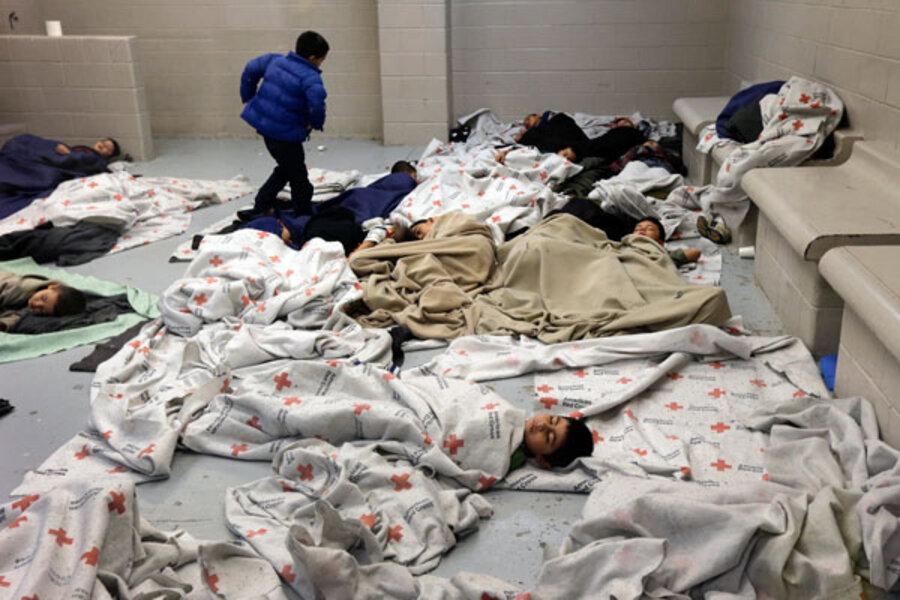Would immigration reform make border crisis better – or worse?
Loading...
Immigration reform keeps finding new ways to die.
First, the Senate in 2013 passed a comprehensive immigration reform bill with such broad bipartisan support that backers said it would "be impossible for the House to ignore." The House has ignored it.
Then earlier this month, a tea party-backed candidate toppled House majority leader Eric Cantor (R) of Virginia in a campaign in which he repeatedly attacked Mr. Cantor over his support for a small portion of immigration reform. "Eric Cantor loss kills immigration reform," the headlines blared.
Now, an evolving crisis on the border, with tens of thousands of unaccompanied children from Central America arriving in Texas, is straining border security "to the breaking point," according to a Border Patrol union official.
To critics, the surge is evidence of the perils of immigration reform. President Obama made it easier for young undocumented immigrants to stay in the country in 2012, and voilà – more than 50,000 young undocumented immigrants have crossed the border so far this fiscal year (up from 6,560 in 2011). Imagine how many will come if America offers some form of "amnesty" to the 12 million undocumented immigrants in the country, they say.
Those charges are impossible to verify, of course. Some activists working with migrants say Obama administration immigration policy is "a secondary or tertiary consideration, if it's one at all" in the current situation, according to USA Today. Migrants are being driven from Guatemala, Honduras, and El Salvador by spiking rates of gang violence, they say.
But there is evidence for the critics, too. An internal Border Patrol memo suggests that "the primary reason" for the arrival of 230 undocumented women and children in May "was a perception that they would be permitted to remain in the country under the administration’s policies," according to The Washington Post. An undocumented immigrant from Guatemala interviewed by Monitor correspondent Lourdes Medrano echoed those statements, saying: "They're saying that women and children are allowed to stay.”
Such comments provide compelling fodder for anti-immigration reform advocates.
Yet in some ways, the events unfolding in Texas also point to a measure of success in border-control efforts. The migrants are crossing through the Rio Grande Valley partly because federal agencies have made progress toward sealing the Arizona border.
President Bush announced a Border Patrol surge in 2003, and most of those resources went to Arizona. That's one reason some of the immigrants caught in Texas have been flown to Arizona. Arizona has more resources to process undocumented immigrants.
The trend line has been a slow shift in immigration traffic from Arizona to Texas. The recent crisis simply confirms that shift.
Mr. Bush's surge involved doubling the number of Border Patrol agents to more than 20,000, creating almost a military presence along the Arizona border, in particular. That has led to its own problems, with allegations of abuse and excessive violence. But it has also been at least partly responsible for the decline in illegal immigration there.
The immigration reform bill that passed the Senate, 68 to 32, last year would again double the Border Patrol – adding 20,000 more agents – and set aside billions for new surveillance equipment.
Texas Gov. Rick Perry (R) asked for assistance along those lines in a letter to Mr. Obama Friday. He requested 1,000 National Guard troops with “arrest powers to support the Border Patrol,” as well as Lakota helicopters and authorization for the National Guard to use Predator drones along the border, according to the Associated Press. Drones have already been increasingly deployed for border security with mixed results.
Immigration reform is, in its own way, a grand bargain. Though partisan lines can blur, Republicans generally put a premium on increased border security, while Democrats seek a pathway to citizenship for some of the immigrants currently in the US illegally. Democrats have so far resisted Republican efforts to break the Senate bill into smaller chunks – passing bills that deal solely with border security without any concrete promise of creating a pathway to citizenship.
In two years' time, when the presidential race is in the balance and Republicans will likely need some appreciable part of the Hispanic vote to win the White House, the situation may have radically changed. But for now, the crisis on the border is only giving Republicans more reasons to hold out. To some, surely, it would appear that the worst-case scenario for immigration reform is already playing out.
Ironically, the only way to strategically address those concerns might be to pass comprehensive immigration reforms.








